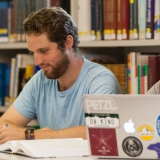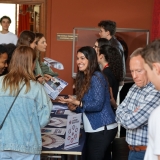Recent Updates
Franklin University Switzerland continues to implement a comprehensive and evolving response to the COVID-19 pandemic. This page will be updated as new information becomes available, so check here for the latest health and policy measures, and to learn about the resources available to students. For ease of access, we have created an easy-to-remember address: www.fus.edu/coronavirus.
Additional details for students are available on Moodle.
General COVID-19 Vaccination information:
COVID Vaccination FAQ
Last modified: August 21, 2023.
2023-2024 COVID Policy
There are currently no measures or restrictions due to COVID-19 at Franklin University Switzerland. However, we are continuing to monitor the situation. We recommend that our community members wear a face mask if experiencing flu-like symptoms and practice basic hand-hygiene regularly. To learn more about the current COVID status in Switzerland visit this site: https://www.covid19.admin.ch/en/overview.
Vaccination
As of May 1 2023, COVID-19 vaccinations in Ticino can only be administered with a valid medical prescription at a local pharmacy or medical office that offers it. The list is available at https://www4.ti.ch/dss/dsp/covid19/vaccinazione/vaccinazione.
For a COVID-19 vaccination to be carried out for travel reasons, a certificate is needed, and the individual should make an appointment at the travel medicine service of the Lugano Civic Hospital (+41 (0)91 811 60 21). Please contact the Franklin Coordinator of Health and Wellness at medicalservices@fus.edu if you need assistance making an appointment. We recommend reviewing the Swiss Federal Office of Public Health (FOPH) website for further guidance on vaccinations: https://www.bag.admin.ch/bag/en/home/gesund-leben/gesundheitsfoerderung-und-praevention/impfungen-prophylaxe.html
Testing
If you tested positive for COVID, you must inform the university by sending an email to medicalservices@fus.edu within 24 hours. We will then provide further health-related support and guidance.



